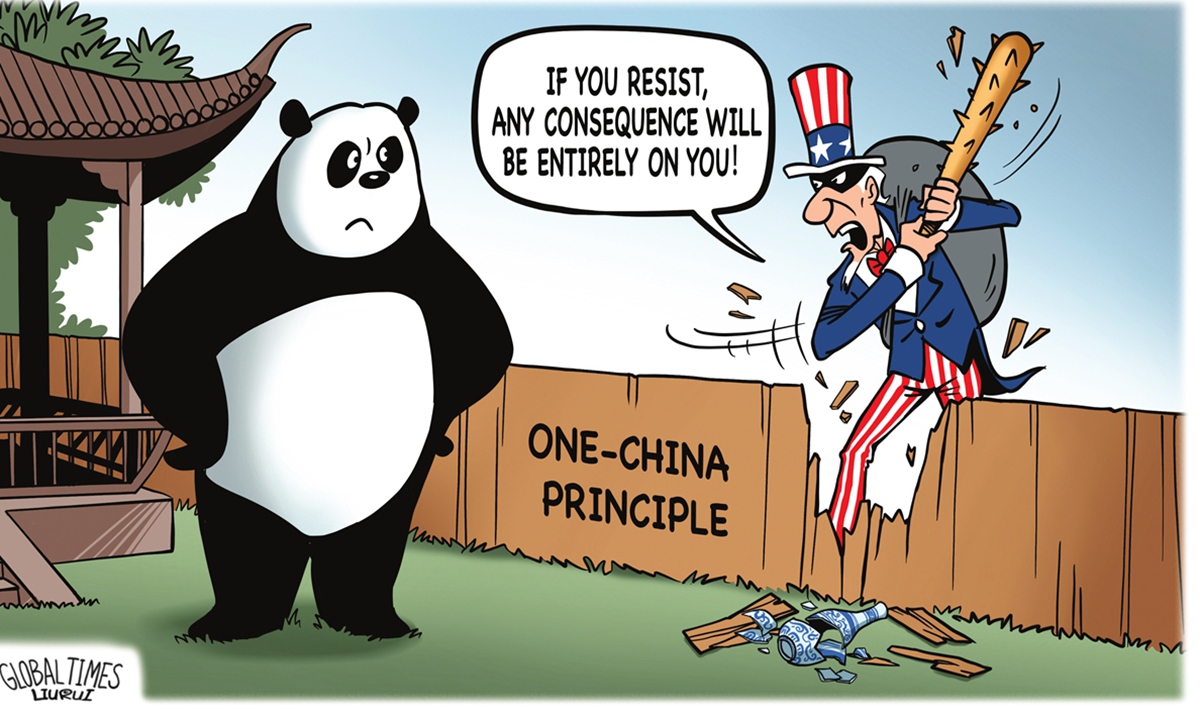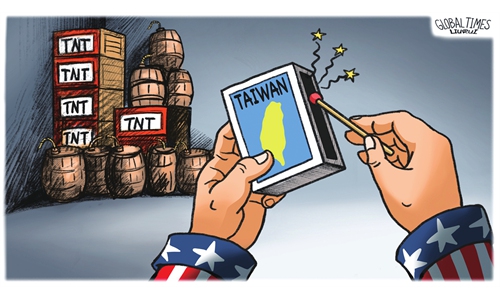
China, US Illustration: Liu Rui/GT
Over the past few days, the US and some of its sidekicks have continued to confuse black and white on the serious consequences of US House Speaker Nancy Pelosi's visit to the Taiwan island. They accuse China of "increasing the risk of misjudgment" for conducting military exercises and training activities, smearing China's countermeasures as "irresponsible steps." Such a tone, as if they are the world's police, not only made 1.4 billion Chinese people, but also people from more countries worldwide, see clearly how Washington has created crises one after another, and then put the blame on the victim.
The current situation is entirely caused by Pelosi and American politicians. China has made the utmost diplomatic efforts before, repeatedly warning the US of the seriousness and danger of Pelosi's visit to Taiwan. However, the US turned a deaf ear, went its own way, and even deliberately ignored China's emphasis - "Those who play with fire will perish by it" - as no more than an often-used metaphor. Now they are manipulating the public opinion by complaining maliciously about China's "overreaction," doesn't the move come from their previous serious underestimation of China's determination and will?
It is both ironic and absurd that the key points of Washington's current accusations against China are only appropriate for the US itself, as if the US thinks of these wordings when looking in the mirror.
For example, the US accuses China of changing the status quo in the Taiwan Straits, undermining regional peace and stability, and using military intimidation. Aren't these US own deeds? If people change the subject of the sentences, these wordings can be seen as an accurate generalization and summary of US' behaviors in the Asia-Pacific region, including the Taiwan Straits, over the years. This time, Washington has brought its extortionist logic into full play.
During the meetings of foreign ministers on East Asia cooperation, US Secretary of State Antony Blinken said that the US side hopes that international law is abided by and that the sovereignty and territorial integrity of all countries are maintained. Chinese State Councilor and Foreign Minister Wang Yi responded that it has been long since the US side last made such remarks, and the US has done the opposite in multiple cases over the years. If the US side can really mend its ways, China will encourage it, but the key is for the US to walk the talk, Wang said, noting that it should first of all fulfill its commitment on the Taiwan question and respect China's sovereignty and territorial integrity, stop interfering in China's internal affairs, and stop conniving at or supporting the "Taiwan independence" secessionist forces. This interaction is very representative and vividly points out the essence of the Taiwan question.
It is certain that Pelosi's visit to Taiwan island is not coincidental, but one of the results of Washington's continuous efforts to "use Taiwan to contain China." Prior to Pelosi's visit, Washington had already significantly relaxed the constraints on official relations with the island, distorting, deflating and hollowing out the one-China principle using the salami slicing tactics, testing China's bottom line and backing up "Taiwan independence" secessionist activities in terms of domestic legislation, arms sales to Taiwan and support for the island's "expansion" in the international space.
In other words, if the US does not pull back from the brink, it is bound to elevate tensions in China-US relations. China will never make any compromise and concession on its national core interests. The problem is not at all about "overreaction." If the US really wants to show a responsible attitude and reduce the risk of miscalculation, as Blinken said, then it should do a deep reflection on Pelosi's visit to Taiwan island and fundamentally reverse its dangerous tendencies on the Taiwan question.
The one-China principle is the political foundation of China-US relationship. When the foundation is broken, the earth will tremble and the mountains will sway. As early as in the 1980s, Chinese leaders stated that if the Taiwan question causes a regression in China-US relations, China cannot but face reality squarely. Today, that will and determination have not changed in the slightest, while China's strength to maintain national reunification is not what it used to be. The US underestimation or miscalculation in this regard is tantamount to playing with fire.
The US' "Pledge of Allegiance" is only a few lines of vow, but "indivisible" is well-marked. The American Civil War was essentially a war against secession, and then US government warned the UK not to "fraternize with our domestic enemy," whether officially or unofficially, or risk an Anglo-American war.
Chinese Ambassador to the US Qin Gang once asked the US, if an American state were to secede from the US and declare independence, and then some other nation provided weapons and political support for that state, would the US government - or the American people - allow this to happen? Any sovereign nation would not hesitate to act when faced with the threat of territorial secession.
After creating tension across the Taiwan Straits, the US and Taiwan island are now talking about "peace" hypocritically. Please don't spoil this beautiful word. During his visit to Bangladesh on Sunday, Wang pointed out that it was the US that deliberately undermined peace across the Taiwan Straits. The US is so used to creating a problem first, and then using it to realize its own strategic plans. There are signs that the US is trying to repeat its old tricks in planning Pelosi's visit, and is taking the opportunity to increase its military deployment in the region, which deserves all parties' high vigilance and firm resistance.
If Washington had the ability to put itself in others' shoes, it wouldn't have provoked China on issues related to its sovereignty and territorial integrity. More than 160 countries have recently reiterated their adherence to the one-China principle. This is the general consensus of the international community and the major trend of the world. Any retrogression that undermines the one-China principle is doomed to become complete failure, the US is no exception.

